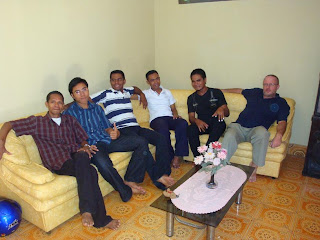Not a lot to report last week really, it's still mango season here so there are enormous delicious mangoes available in the market (about RP5.000 or €0.30 for four or five of them). They make for a great breakfast but apparently it's a well known fact among Maumereans that eating mangoes first thing in the morning is not a good idea. I can now report that there appears to be a sound basis for this wisdom as Tuesday was spent at home instead of in the office (fortunately home is only about two minutes from the office..).
Saturday saw two more party invitations, this time it was graduation day at UNipa, one of Maumere's third level institutions and I was invited to two family celebrations for newly qualified nurses. At the first of these, we were seated indoors (quite unusual for here but this was obviously a well-off family as was evident from the house construction and the furniture). The wealth didn't extend to air-conditioning unfortunately and the heat was unbelievable so I would have preferred to be seated outside in the gentle breeze rather than in a pool of my own seat on a squeaky sofa !
So, on to the VIP..
On Sunday, the hospital was gripped with excitement as we awaited the official visit of the newly appointed Minister for Health, all the way from Jakarta. The new minister (who is a doctor) worked in Maumere for three years when she was newly qualified and her husband is either from Flores or also worked here (I couldn't figure out which) so she was keen to pay a visit to her old home. She was due to arrive at the hospital at 12 noon and spend two hours visiting three wards and meeting staff and patients, followed by a tree planting ceremony and a bunfight. She turned up bang on time at 2.15 p.m. (which is about normal) at the head of a cavalcade of at least twelve official cars all crammed with hangers on, was greeted at the front door by some traditional musicians and dancers and Dr. Asep (the hospital director) and whizzed around the three departments, including the ICU – I'm not sure what the still unwritten infection control policy will have to say about one hundred visitors all marching in there ! - in double quick time. Unfortunately the long awaited rainy season decided to start just as the tree planting ceremony was about to take place so that was quickly shelved and she was then running so late that the bunfight (carefully prepared by Dr. Candida, Dr. Asep's wife) in the conference hall was left to the staff to fight over after her departure.
Dr. Asep and the newly printed organisation structure in the main entrance hall of the hospital.
The musicians and dancers preparing for the Minister's arrival.
Dr. Candida (left) preparing the snacks
Dr. Asep greets the Minister
The hole is filled by the rain rather than the tree...
Everyone turned out in their best bib and tucker including my friend Petrus, who I suspect designed his uniform himself as he is the only security guard in the hospital who dresses like this (and he is really proud of it as you can see !)




















